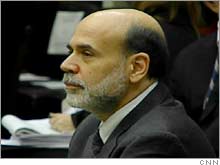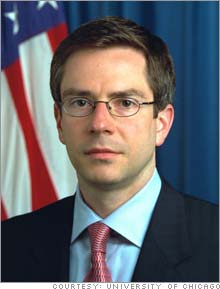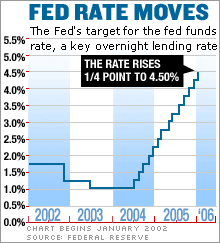Bush quietly reshaping the Fed
Low seniority for central bankers could mean rates go higher than they need to, hurting growth, or sparking recession.
NEW YORK (CNNMoney.com) - Few presidents have had the opportunity to shape the Federal Reserve the way President Bush has this year. Once Bush replaces Vice Chairman Roger Ferguson, the only Democrat on the Fed's board who resigned recently, four of the Fed's seven governors will have taken office in 2006, and all seven will be Bush appointees. That would make Bush only the third president to place all seven governors on the board, after Ronald Reagan in 1988 and Franklin Roosevelt in 1936. The new Fed members, and their relative lack of seniority at the central bank, could end up having a big impact on your finances. That's true even though very few average Americans, not to mention a number of lawmakers, could name any of the governors, aside from new Fed Chairman Ben Bernanke. The need for the Fed and its new members to establish their credentials as inflation fighters could prompt the central bank's policy-makers to raise interest rates a quarter-percentage point or perhaps even a half-point more than more seasoned policy-makers would have, Fed watchers and economists say. "As a group, they will have a sense they have something to prove and that what they have to prove is they can be tough on price stability," said Tom Schlesinger, executive director at the Financial Markets Center, a research group that tracks the Fed. But Schlesinger and others say they also think that this group is relatively united in the belief that combating inflation is the more important part of their dual mandate, the other part being the promotion of economic growth, even though Fed governor Mark Olson registered a rare dissenting vote against raising rates at the Sept. 20 meeting after Hurricane Katrina. "If Bernanke turns out to be a stern hawk on inflation in the manner of (former Fed chairman Paul) Volcker, it's not clear to me that Olson (or the other Bush appointees) will lay down in front of his tracks to try to stop that train," said Schlesinger. That's not necessarily good news for the Bush administration, with Republicans facing what is seen as tough mid-term elections this fall. Strong economic and job growth are usually a better environment for incumbents than is low inflation. "If the Fed overshoots, we could potentially see a recession by the end of this year, which could be the worst case scenario for Bush," said Ian McCulley, an analyst with Grants Interest Rate Observer. Fed picks under Congress' radar
Still, Bush's selections to the nation's central banks have barely had any public or even Congressional scrutiny, compared to the Washington blood sport that's been the battle over his Supreme Court nominees. To be sure, Bernanke's appointment and confirmation hearings got news coverage, but some leading senators admitted to the media they weren't aware the hearings had even been held. Bernanke sailed through without any serious opposition, even though he advocates the somewhat controversial strategy known as "inflation targeting." That policy uses a preset formula for interest rate hikes if inflation reached certain levels, even if the economy is experiencing a combination of higher prices and slower growth at the same time. "I think most people in Congress don't understand or care much about monetary policy," said McCulley. "It's not a divisive issue they can throw at the other party. It's too much of a wonk issue to get into a conversation about inflation targeting." And the new Fed makeup may make it easier for Bernanke to win approval of an inflation targeting policy sooner rather than later, according to some Fed watchers. The departing Ferguson was one of those on the record as opposing inflation targeting. "This (next appointment) could be the one who tips the balance," said Gus Faucher, director of macroeconomics at Moody's Economy.com, regarding who Bush nominates to succeeds Ferguson. "If Bush nominates a strong proponent of inflation targeting, it would be a signal they want (that)." Fed watchers say they have doubts how much Congress would fight such an inflation targeting advocate joining Bernanke, even if there are misgivings about the policy. There doesn't seem to be much interest or stomach in probing the nominees, even though some say that would be well worth it. One of Bush's two most recent picks for the Fed, Randall Kroszner, is a very conservative economist who had been a University of Chicago professor. Schlesinger at the Financial Markets Center says Kroszner has argued in his writings that markets and private entities, such as credit rating agencies, are always superior to government regulations, supervision and safety nets in regulating financial markets. "People are always trying to explain the lack of questions as saying there's a consensus around monetary policy, but there's anything but a consensus on monetary policy," said Dean Baker, co-director of the Center for Economic and Policy Research. "What upsets me more than anything is no one is asking serious questions." The other recent Fed pick was White House economic staffer Kevin Warsh. He was criticized outside of Congress for a thin resume -- he is only 35, making him the youngest Fed governor in history, and has neither a Ph.D. nor an economics degree. He is also the son-in-law of Ronald Lauder, a major Republican contributor and a member of the family that controls Estee Lauder Cos (Research). But both Kroszner and Warsh sailed through on voice votes in the Senate with nary an objection and virtually no coverage in the media -- even though critics were comparing Warsh to Harriet Miers, the White House counsel whose nomination to the Supreme Court was withdrawn under a hail of criticism about her qualifications. "I would have thought the Warsh appointment would get a lot more attention, but most senators don't care, they don't think about it," said John Silvia, chief economist for Wachovia.
For a special report on the Federal Reserve, click here. |
| ||||||||




